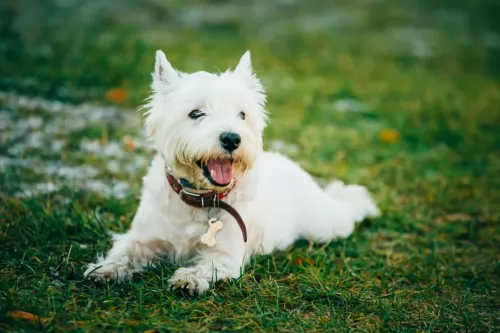 Petzlover
Petzlover West Highland White Terrier is originated from United Kingdom but Japanese Spitz is originated from Japan. Both West Highland White Terrier and Japanese Spitz are having almost same height. Both West Highland White Terrier and Japanese Spitz are of same weight. Both West Highland White Terrier and Japanese Spitz has same life span. Both West Highland White Terrier and Japanese Spitz has almost same litter size. West Highland White Terrier requires High Maintenance. But Japanese Spitz requires Low Maintenance
West Highland White Terrier is originated from United Kingdom but Japanese Spitz is originated from Japan. Both West Highland White Terrier and Japanese Spitz are having almost same height. Both West Highland White Terrier and Japanese Spitz are of same weight. Both West Highland White Terrier and Japanese Spitz has same life span. Both West Highland White Terrier and Japanese Spitz has almost same litter size. West Highland White Terrier requires High Maintenance. But Japanese Spitz requires Low Maintenance
 The West highland white terrier originated from Poltalloch in Scotland. So they were initially called as Poltalloch terrier and after that they were called as Roseneath terrier. They were initially used for hunting fox, badger, otter and in killing the vermin like rats.
The West highland white terrier originated from Poltalloch in Scotland. So they were initially called as Poltalloch terrier and after that they were called as Roseneath terrier. They were initially used for hunting fox, badger, otter and in killing the vermin like rats.
The breed history says that Colonel Malcolm of Poltalloch was the reason for the Westie's white colour. This is because in 19th centuryhe went for hunting with his dogs and accidentally he shot his dog as its colour was as fox. So he decided to breed only white colour dogs.
 Spitz dogs include quite a few dog breeds and these dogs all have similar characteristics – pointed, erect ears, slanted type eyes with thick fur.
Spitz dogs include quite a few dog breeds and these dogs all have similar characteristics – pointed, erect ears, slanted type eyes with thick fur.
The Japanese Spitz was developed by Japanese breeders at the time of the 1920s, and bringing in quite a number of dog breeds to do so. The breeders started with the white German Spitz dogs but later other white Spitz breeds were imported and crossed into this developing breed.
The final standard for the breed after World War 11 was accepted by the Japan Kennel Club. The dog became recognized by other kennel clubs of the world.
 The Westie can be said as that a small dog having the talents of the big dog. They are very popular for their obedience. They are also working as therapy dogs and also some in search and rescue teams. The home having Westie will have fun always and be enthusiastic. They will suit them for country or city living, but they like to live with their family. They are well suitable for apartment living, but some training should be given to them for not barking. They can stay in home when you are at work. Westie can be taken to travel, whether it may be long vacation or a short visit.
The Westie can be said as that a small dog having the talents of the big dog. They are very popular for their obedience. They are also working as therapy dogs and also some in search and rescue teams. The home having Westie will have fun always and be enthusiastic. They will suit them for country or city living, but they like to live with their family. They are well suitable for apartment living, but some training should be given to them for not barking. They can stay in home when you are at work. Westie can be taken to travel, whether it may be long vacation or a short visit.
They are quick learners and so training them is not difficult. Mistakes of them can be corrected patiently since they don't like harsh activities against them. Westie will definitely bark when he sees something or hear different sounds. He will bark on seeing visitors or even other dogs. Sometimes they will bark for very silly things but when given appropriate training in their young stage, they can bark only for alerts.
 The Japanese Spitz is a small to medium sized dog, being somewhat larger than the Pomeranian. The dog stands at 25 – 38cm, both male and female and weighs anything between 5 to 10kg.
The Japanese Spitz is a small to medium sized dog, being somewhat larger than the Pomeranian. The dog stands at 25 – 38cm, both male and female and weighs anything between 5 to 10kg.
The double coat of the dog is thick and white and the puppies look like large snowball.s He has a pointed muzzle with erect ears and a tail that curls up over the back.
The pure-bred Japanese Spitz, just like other Spitz dogs are smart, inquisitive dogs who show loyalty to their owners, getting on well with children in the home and making a good family pet.
They can be quite stubborn, so training and socialization becomes important if you want him to be obedient. Training is easy as he is an intelligent, bright little dog.
They’re able to adapt to life in the city or in the country, but if you live in the city, you will need to meet his exercise needs.
He can tolerate cold weather quite well but as a companion dog, he prefers being indoors with his human family.
Even though they are small dogs, they are protective and make good watchdogs. They were bred to be companion dogs and they take this role seriously, being loyal, entertaining, fun, friendly and loving with their human family.
It is why they are becoming such a popular breed as they have an amicable nature, getting on well with other pets as well as children.
 The Westie is friendly with children but not all the time. So some care should be taken while they are near children.
The Westie is friendly with children but not all the time. So some care should be taken while they are near children.
They like to chase rodents like rabbits as they are interested in hunting.
They are suitable for apartment living unless they are left alone for a very long time. They love cold weather more than hot.
They can be trained by giving some extra efforts.
 Your Japanese Spitz is going to make you a superb companion and you want to ensure that you are well prepared for him when he arrives. He is feisty, charming, social, bright, alert, active, loyal and loving and you want to be sure that he has everything laid on as a 4-legged family member.
Your Japanese Spitz is going to make you a superb companion and you want to ensure that you are well prepared for him when he arrives. He is feisty, charming, social, bright, alert, active, loyal and loving and you want to be sure that he has everything laid on as a 4-legged family member.
He isn't a high maintenance dog, he isn't demanding and if you love and care for him, you'll find that he fills a vacancy in your life that you'll never want to be without again.
 Life expectancy for the Japanese Spitz is about 10–16 years. They are a healthy breed with few genetic problems. Nothing is set in stone though, and your healthy dog can fall prey to some of the many common dog illnesses there are.
Life expectancy for the Japanese Spitz is about 10–16 years. They are a healthy breed with few genetic problems. Nothing is set in stone though, and your healthy dog can fall prey to some of the many common dog illnesses there are.
They're so sweet, you're tempted to feed him treats all the time, but obesity is a common Japanese Spitz health issue and obesity can lead to many problems with the heart, kidney, diabetes and even joint pain.
Also, eye problems such as ingrown eyelashes and a lower eyelid that rolls inward are problems that are known to trouble these Spitz type dogs. It leads to terrible irritation and damage to the eye. It's definitely time to see the vet to avoid infections and injury.
 The puppy should be fed 3 to 4 times per day as it requires a considerable amount for their growth. Cooked chicken breast and turkey are best for them and also vegetables should be given to them. Beef and chicken should be kept a limit as it will lead to itchy skin and allergies.
The puppy should be fed 3 to 4 times per day as it requires a considerable amount for their growth. Cooked chicken breast and turkey are best for them and also vegetables should be given to them. Beef and chicken should be kept a limit as it will lead to itchy skin and allergies.
The preferable food for the Westie is home cooked. The home food will only contain all the essential nutrients for the Westie.
Eventhough the Westie is suitable for apartment living it is recommended to have a daily walk for him to be active and refreshing.
They should be made to play for atleast 30 minutes per day for their health as to not gain overweight. Grown up children can play with them as they like it.
 The Japanese Spitz is an active dog and he will require at least one walk a day to keep him happy. He is full of beans and wants to go with you on all your outings.
The Japanese Spitz is an active dog and he will require at least one walk a day to keep him happy. He is full of beans and wants to go with you on all your outings.
The diet of your Japanese Spitz is basic to his good health. If you feed him low quality foods deplete of vitamins and minerals, you'll end up with a sick dog who is always at the vet. Puppies need 4 small meals a day while an adult dog can have 1 or 2 meals a day.
He can benefit from the top quality commercially manufactured foods and sometimes you can add in some cooked chicken, rice and vegetables into his dry kibble. Add in a little bit of raw meat too from time to time and ensure that he can always reach his bowl of fresh, cool water.
The beautiful white fur of your Japanese Spitz will need to be brushed at least twice a week to keep it free from loose hair and to keep the fur bright and vibrant.
Check his nails and avoid them getting too long as they can hook on things and cause injury. Check his ears inside and out, keeping them clean and free of debris. Very importantly, keep his teeth clean as dental disease can play havoc with a dog's health.